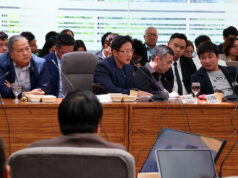Senate leaders see no need for COVID-19 supplemental budget
THE passage of a supplemental budget as additional fund source in addressing the crisis brought by the coronavirus disease 2019 (COVID-19) is not needed, Senate President Vicente C. Sotto III said on Sunday. Mr. Sotto said the “Bayanihan to Heal as One Act” or Republic Act 11469 already allows President Rodrigo R. Duterte to realign items in the 2019 and 2020 Executive department budget, including those of government-owned and -controlled corporations. “Kung tutuusin… nandoon lahat ang binigay naming power doon sa RA 11469, hindi na kailangan ng (If you look at it, it’s all there in RA 11469, no need for a) supplemental budget,” he said over DzRH radio. “Alam namin na kailangan mas malaki ang (We know that there is a need for a wider) elbow room, napakalaki ng binigay na special power sa Pangulo, sa Executive department para magawa ‘yan (we have given an extensive special power to the President, the Executive department, to do that.” The law is intended to fund the P5,000–8,000 monthly emergency subsidy to low income households, among other budgetary requirements in addressing the impact of the COVID-19 pandemic. Senator Panfilo M. Lacson, vice chairman of the Finance committee, sought clarification on why the government is asking additional funding, noting that an estimated P600 billion were left unused from the 2019 budget. Senator Juan Edgardo M. Angara, who chairs the Finance committee, said last week the committee is open to hearing the proposal when sessions resume on May 4.
TRANSPARENCY
At the House of Representatives, Speaker Alan Peter S. Cayetano said with all items in the 2020 national budget open for use to support the government’s COVID-19 response, they want better transparency in the disbursements. He said reports should be more specific as to what projects will be scrapped or postponed. “(We) want it to be done openly… Ang sinasabi lang namin (What we are saying is), DBM (Department of Budget of Management) is doing it in a very untransparent way,” Mr. Cayetano said. The Speaker’s remark came after the DBM issued National Budget Circular No. 580 on Wednesday stating that 35% of identified funding under the 2020 budget will no longer be released starting April 1 for all state departments, agencies, state universities and colleges, GOCCs and other state offices. The DBM also said at least 10% of the total released allotments to national government agencies for maintenance and other operating expenses (MOOE) and capital outlays that are not related to the COVID-19 response efforts shall no longer be available. Mr. Cayetano called on the DBM to report back to Congress regarding the funds needed for the COVID-19 response. — Charmaine A. Tadalan and Genshen L. Espedido
OECD flags PHL’s limited COVID-19 testing capacity
THE Organisation for Economic Co-operation and Development (OECD) has flagged the limitations in the Philippine’s healthcare system, particularly its coronavirus disease 2019 (COVID-19) testing capacity, which could mean there are far more cases than being reported. In its study titled COVID-19 Crisis Response in ASEAN( Association of Southeast Asian Nations) Member States dated April 21, the 36-nation OECD said Philippine “health officials acknowledge limited testing for the Covid-19,” which “means that, like Indonesia, its already overstretched health system could be phasing far more infections that the numbers indicate.” The Philippines had 7,579 confirmed cases as of April 26, majority of which are in the National Capital Region (NCR), according to the Department of Health (DoH). As of April 24, the DoH said it has so far tested 81,292 people. The country currently has a capacity of at least 8,000 tests daily with 17 accredited laboratories. The government is aiming to hit a 20,000 daily capacity by the end of the month with the accreditation of more testing centers. The Philippines has a population of over 100 million with about 13 million in NCR as of the last census in 2015. — Gillian M. Cortez
Freelancers, self-employed told to organize for easier assistance
FREELANCERS, independent contractors, and those who are self-employed should organize themselves so it would be “easier” for the government to assist them, House Speaker Alan Peter S. Cayetano said on Sunday. “With an organized group, it would be much easier for self-employed workers to voice out their sentiments to the government, and how we can help their sector,” he said in a statement. While there are already government programs to provide assistance to workers and low-income families affected by the enhanced community quarantine, Mr. Cayetano said there is difficulty in identifying some target beneficiaries due to lack of an updated database on informal workers, including those who are self-employed. “While most of them pay taxes, many are not members of the SSS (Social Security System). This will make it difficult for them to receive assistance because they are not part of the database,” he said. Under the proposed economic stimulus measure that is currently being discussed in the Defeat COVID-19 Committee of the House of Representatives, freelancers, self-employed workers, independent contractors, and repatriated overseas Filipino workers will be included in the list of workers that can benefit from the wage subsidies. — Genshen L. Espedido
Workers group seeks P10K monthly subsidy
A LABOR group has recommended a P10,000 monthly subsidy or the current minimum wage, whichever is higher, for workers affected by the disruptions brought about by the coronavirus disease 2019 (COVID-19) crisis. The Federation of Free Workers (FFW) on Sunday said the government should “provide universal support, like an income guarantee, equivalent to the prevailing minimum wage or P10,000 a month whichever is higher to avoid the bureaucratic bottleneck.” The government first offered the COVID-19 Adjustment Measures Program (CAMP) for workers affected by the lockdown imposed to mitigate the COVID-19 spread, but the fund allocated was not enough to accommodate all applications. The CAMP is a one-time P5,000 assistance program per worker. Another program launched, the Small Business Wage Subsidy (SBWS), will provide between P5,000 to P8,000 per month for two months. FFW, however, said the SBWS has “more stringent requirements” that will be difficult for workers to meet during the lockdown period. — Gillian M. Cortez
BI readies deportation of 44 Chinese in illegal offshore gaming operations
THE Bureau of Immigration is identifying the 44 Chinese arrested Friday in Parañaque City in a raid on an illegal Philippine Offshore Gaming Operator (POGO) in preparation for their deportation. BI Dana Krizia M. Sandoval said they are coordinating with the police to verify the identities of the foreign nationals found operating a POGO, which is not among the exempted sectors under the current quarantine policy. “We will be verifying their individual records to be able to file the appropriate deportation cases against them,” she said in a mobile-phone message Sunday. She added that they are gathering more information with the police on whether the suspects have cohorts or similar establishments are operating in the area. “We will not take this lightly. Foreign nationals that are in the country must abide by our laws lest face criminal and immigration sanctions,” she said. The Chinese were arrested along with nine Filipinos. — Vann Marlo M. Villegas




